How To Correct A Dog That Ignores The Recall?
Working out how to correct your dog when he ignores the recall is tricky. After all, you can’t punish your dog according to traditional training methods if you can’t get near them. Dog correction devices like shock collars or spray collars that work remotely are also now well understood to be unkind, confusing to the dog and ultimately unsuccessful as training aids. Today I’ll share how I train dogs to never ignore the recall, and what I advise you do when dog correction can’t go to plan. Positive and rewarding dog recall training is the key to a perfect recall command. And good dog recall training is never quick because your dog needs to learn to come when called regardless of what else is happening around them.
Contents
- Dog correction and consequences
- Can you outrun your dog?
- How to correct your dog when he ignores you
- Dog training and management
We have all had that sinking feeling. You call your dog, you know he has heard you, and he totally ignores you. You know you need to act straight away or the habit of ignoring you will get worse. But what should you do? What is the best reaction? How should you correct your dog during recall training?
Dog Correction and Consequences
Dog correction by traditional dog trainers used to be physical and immediate. To correct your dog you’d need to run them down, grab them and get mad. Unfortunately there are huge practical problems with this approach.
Dog behavior can only be modified by any consequences you provide, if those consequences follow the behavior rapidly. Dog correction must be carried out immediately. We are talking seconds here, not minutes. You have to get out to correct the dog before he leaves the place where he ignored you, and before he forgets what it is he did wrong.
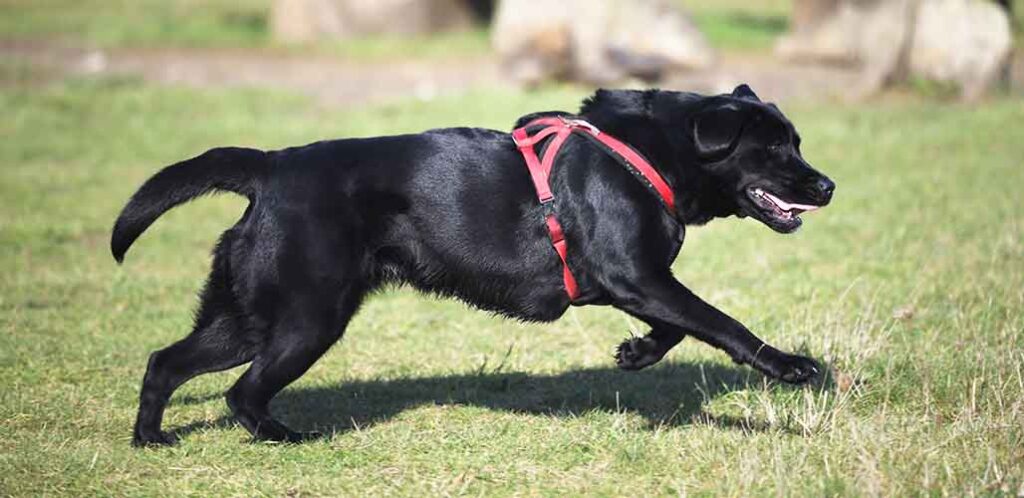
Dogs Can Run Faster Than Humans
Dog correction is possible. A good sprinter may be able to accurately (and therefore effectively) correct the dog. So that he learns from the experience. But more often than not, by the time you reach him, assuming you can catch him, the dog hasn’t a clue what he is being corrected for. Don’t forget that when plunging through undergrowth or up a hill, four legs have the advantage over two!
Dog Correction Techniques Can Damage Your Relationship
Dog correction damages recall training. Punishing your dog means that in his eyes you become the ‘bad guy’. This may be only temporary, but the effect can be very harmful to the whole recall process. Dog correction must be pretty unpleasant in order to counter the fun that the dog just had ignoring your boring old pleas for him to ‘come here’. Just how mean are you prepared to be?
The essence of good dog recall training lies in creating a situation where the dog feels the urge to be next to you more than anything else in the world when he hears that recall command. If you have punished him, no matter how moderately, you will have reduced his desire to get himself next to you.
This is counter productive and there seems little point in shooting yourself in the foot when there is a better alternative. So if there is no point in correcting the dog at all, what should you do?
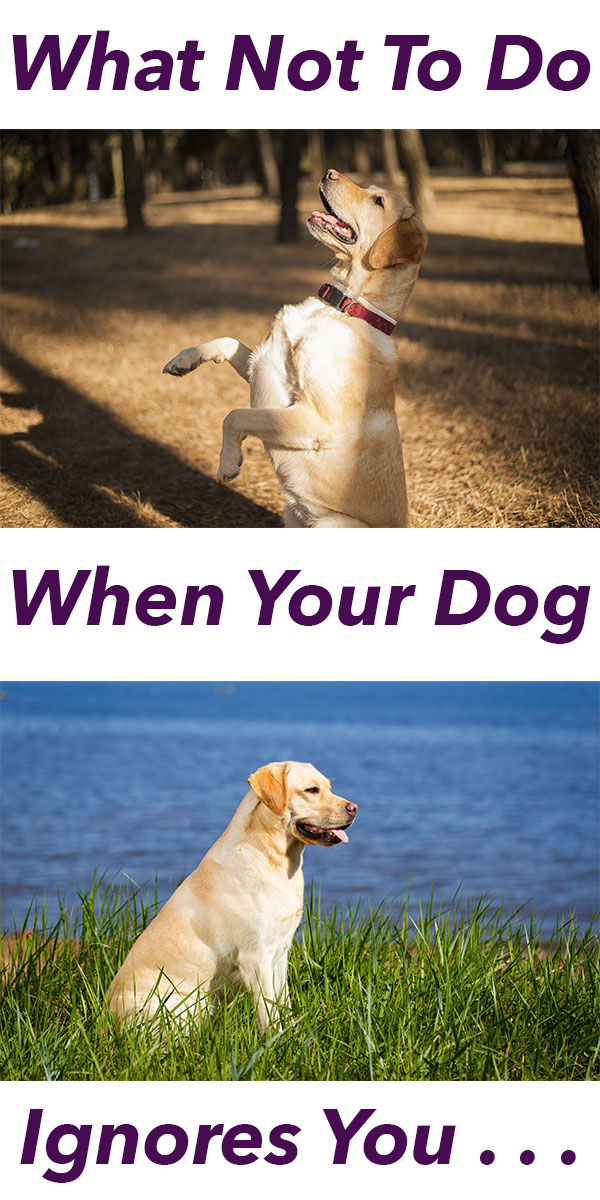
What to do when your dog ignores you
Dog correction should be replaced with three actions.
- Recovery
- Management
- Training
The first is to recover your dog. And the second is to take steps to ensure that he isn’t given opportunity to ignore you again. In other words, to manage his future behavior more carefully until you have completed the third step – dog recall training.
Recovering your dog
If your dog is not too pre-occupied, the best strategy is simply to make a lot of noise (to attract his attention) and without pausing turn and run away from your dog. As fast as you can.
Most dogs cannot resist running after a whooping, hollering crazy human friend. If your dog is rushing off to play with another dog and ignores your whoops, shouts and whistles, you are simply going to have to go and get him.
Don’t run after him aggressively, telling him what you would like to do to him when you get hold of him (however tempting that may be). Simply walk quietly after him and take hold of his collar at the first opportunity you get. Turn him towards you and reward him immediately the second he gives you any attention at all.
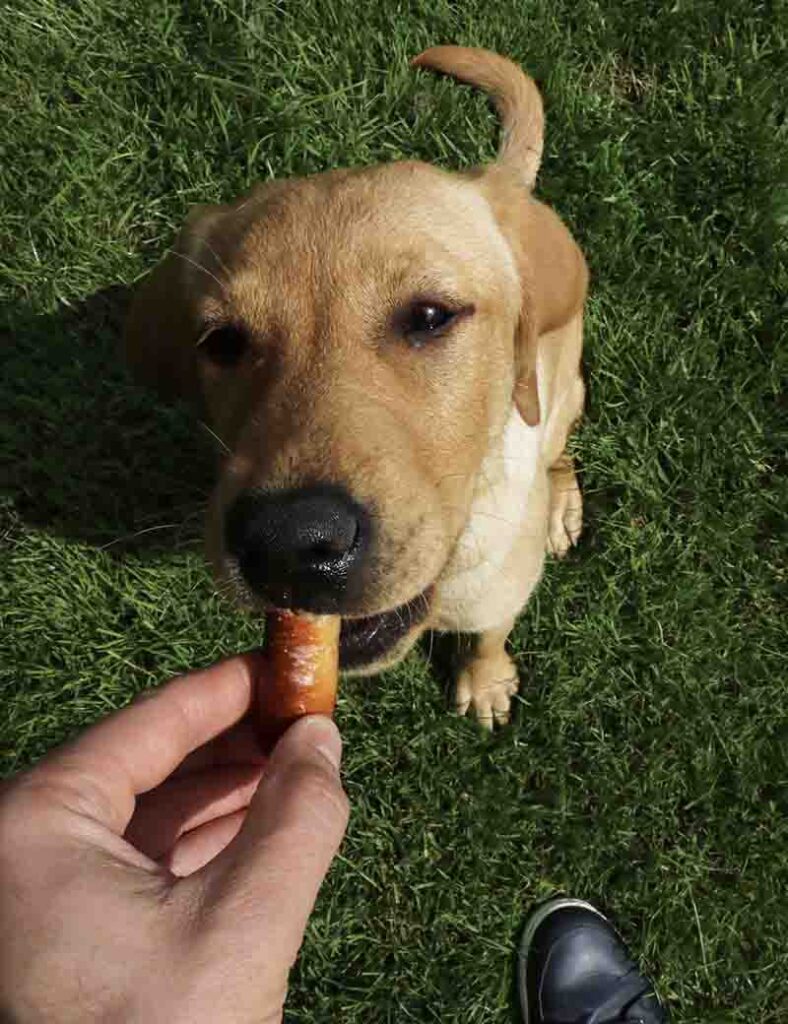
If you don’t have a reward on you, make a mental note to always have rewards with you in future! Obviously, you don’t want to be in this position again in the future, so you now need to make a plan to manage your dog in situations where he is able to run off and ignore you.
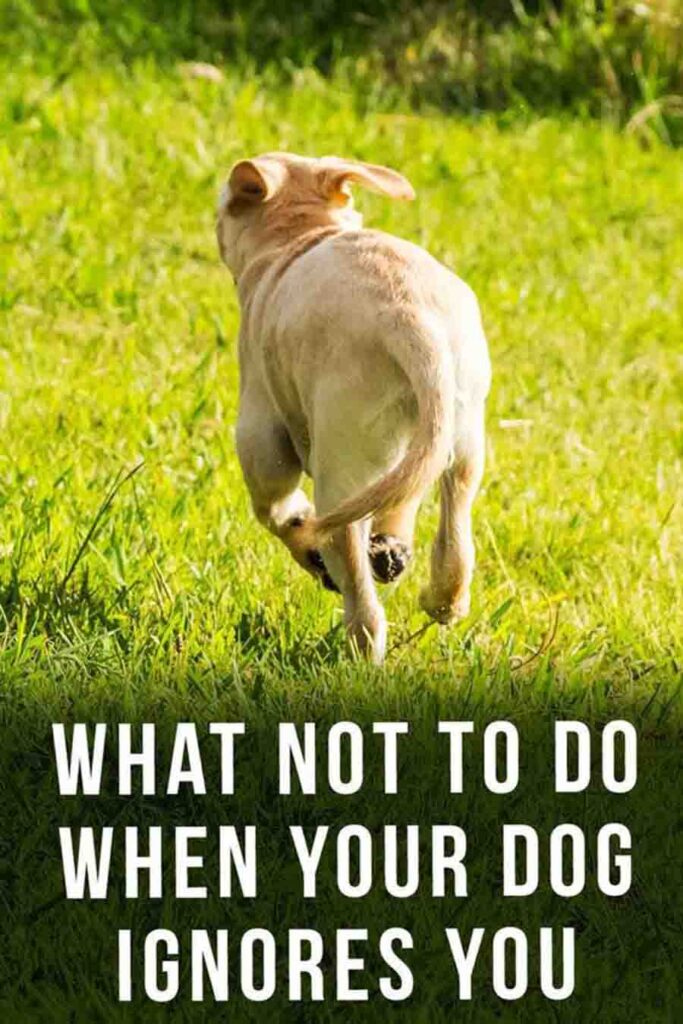
Managing your dog
There are two aspect to managing the dog that isn’t (effectively) recall trained. The first aspect is to stop calling the dog unless you are certain you can ensure he does not ignore you. The second aspect is to prevent him from running off and evading you.
Stop calling your dog
Every time you call your dog and he does something other than return to you, you are badly damaging your recall command.
If this happens more than a very few times, your recall command will become useless. Don’t call a dog that has not been taught to recall EXCEPT in the context of your dog recall training programme
Stop your dog running off
The best way to manage your dog in public places, until you have trained him, is with a long line attached to a body harness.
The harness is important just in case the dog runs after you pick up the line, or in case it gets caught on something. Attaching the line to a collar can hurt your dog’s throat when he comes to a sudden stop.
The default situation with the long line is that it is left to drag along the ground. When you anticipate trouble, you can pick up the end without the dog guessing you are about to interrupt his fun. It is also a brilliant training aid. And training these days is carried out using rewards rather than corrections
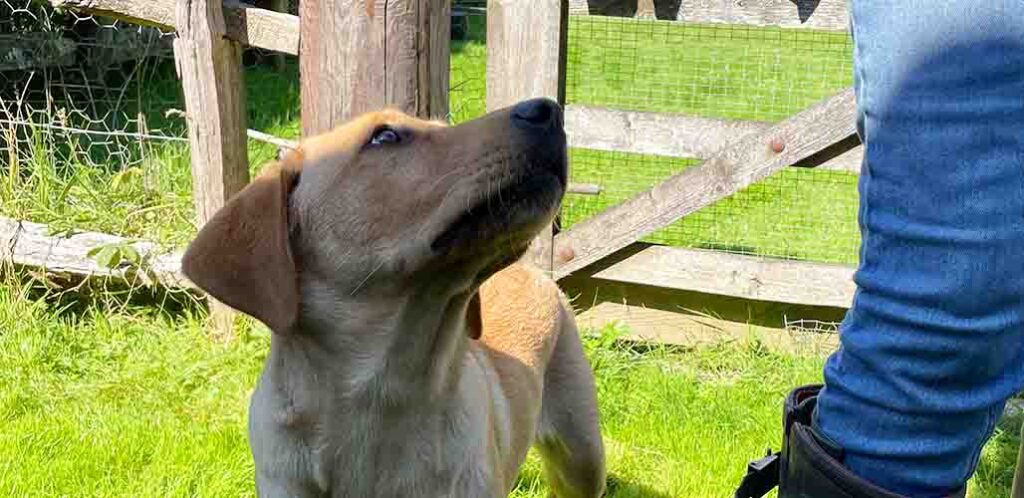
Teaching Your Dog to Come
These days I teach the whole dog recall training process using only rewards. The trick is to increase the level of difficulty in stages. And to limit the opportunities that the dog has for ‘self-rewarding’ until he is ‘fluent’ at responding in any given situation.
You will need to use really generous rewards each time you make things more difficult, fading them out when the dog has got the hang of it. And ramping them up again when you introduce the next level of difficulty.
If your dog has already got into bad habits, then a biscuit is not going to cut it. You are going to need some seriously tasty roast chicken or beef. Don’t worry, you won’t need to be a walking delicatessen forever, rewards can be faded and reduced as the dog becomes more competent. And don’t forget, the first step in training a dog to come when he is called is to stop calling!

How to correct a dog that ignores the recall
The answer to the question in the title (okay it was a little cryptic, but you have come this far so hang on in there!) is that successful recall requires a shift in approach. You need to stop banging your head on the proverbial brick wall and acknowledge the problems involved in correcting a dog that is probably hundreds of yards away.
The answer is to do what all successful modern trainers now do with every dog they train. They prevent the dog from absconding while they teach the recall in stages with effective rewards.
Anyone can teach this. Any dog can learn this. To find out how to train a recall effectively and without force, check out our free mega training guide: How to train a puppy or dog to come
It’s completely free and it gives you step by step instructions for teaching your dog to come each and every time you call. Don’t forget the three steps we talked about above
- Recover
- Manage
- Train
Those are your keys to success.

Free Labrador Updates!
Get my training tips, news, reviews, and the latest from The Labrador Site delivered to your inbox


i have a 10 year old lab, who I would say in the past has had 70% recall. Lately it has become terrible to non existent.
I have always treated him when he returns to me, and that usually 70% of the time works. The times it hasn’t worked in the past is if he’s trying to chase a runner or cyclist (totally unacceptable I know, I do keep my ears and eyes peeled for these!), or if he has found something totally disgusting to eat. Lately however, he is always looking for things to eat, to an almost obsessive point. He’s fed the best food he can have, he was on raw diet, but this gave him reflux, so he now has the Royal Canin gastro-intestinal diet. On our walks he totally ignores other dogs and people (except runners and cyclists) and totally ignores me. It has now got to the stage that he is on the lead more than he is off. So frustrating! Is he now too old to train, or he he doomed to a life on the lead? If there is emoting I can do, will the tips mentioned on this page work for a 10 year old. I’ve had him since he was 7 weeks.
Many Thanks
Hi. What can I do if my dog goes out with a dog walk 4 times a week? 🙁
I can train her morning and evening but in the afternoon she goes out with a dog walker .
Hi,
we have an 18 month old rescue called Bella. She is friendly, lovable and loves other dogs/humans.
My hubby let her off the lead (straight away, when we got her at 5 months) before she had really ‘bonded’ with us… and she has been let off a lot to ‘self reward’. Which we now realise. We are now working through the book and hoping to get to a stage where we can eventually let her off safely.
I think I am looking for someone to say ‘it will be okay one day’ – as we love walking a dog off lead and it’s just not enjoyable anymore… but at least it’s ‘safer’.
I’ve had very good luck with my lab mix rescue with something I call “back touch”. We practiced it often while hiking when there were no immediate distractions. I say “back touch” and he knows he has to come back close enough and long enough to feel me touch him. If he misses the tag he has to come back. I’ve made it a fun game but it give me the opportunity to get a hold of him if need be. At this point, after LOTS of practice, I can turn him on a dime at any distance. Important to practice this and continue to practice this at many distances.
When my 8 year old border collie ignores me all i have to do is say “hotdog” and he will come running of course i then have to give him a hotdog
I have a two year old black lab. I would like to have one of his puppies before, he’s fixed. I live in canton, GA. Please let me know what to do. Thank You Jahdah and lucus
Here you go Jahdah – this has the information you need https://www.thelabradorsite.com/so-you-want-your-labrador-to-be-a-stud-dog/
Why not rescue a black lab puppy? Plenty of them around.
My dog is a great dog but when she’s outside sometimes when I call her she runs away and sometimes she doesn’t! Am I scaring her
(I notice this comment was a while ago but for anyone else with the same situation) she’s probably not scared, she’s probably just enjoying the “game” of running away from you. It’s fun to run away and have someone chase you! That’s why kids love to play tag.
When my dog does this I make a weird high pitched sound (like a trill or a shriek) and I run away from her instead. Next time your dog runs try it. If she is just playing, doing this should get her attention and cause her to run after you (now she’s “it” and she gets to chase you). When she catches up to you, drop down to the ground (lying down works really well but if it’s a hard pavement you could kneel, sit or crouch down low instead), keep your face and body language “happy” and playful and call her in an excited high pitched voice. She should come right up to you (and probably try to lick your face), so you can grab her before she runs again. As soon as you have hold of her praise her to the high heavens and give her a reward and she’ll realize that being “caught” is fun too and she’ll be more likely to willingly be caught in future.
Never scold or get angry with a dog when they return to you (no matter how long it’s been) or they’ll be more averse to returning in future. If you make it fun and rewarding they’re more likely to want to come back.
My 4 year old rescued St Bernard/Anatolian Shepard mix, when given food as rewards, will not leave my side and play wIth other dogs at the dog park. He will also follow anyone who has treats . We usually have to leash him and take him home. Denial of play time doesn’t correct the behavior either . Help please.
Don’t feel like your dog HAS to play with other dogs if he doesn’t want to. If he’s not showing interest and would rather stay near you to get the treats try giving him tasks to do to earn the treats – teach him to fetch a ball, do some complex tricks or some obedience commands (e.g. long distance stays) instead. If he’s exercising his brain that’s even better than physical exercise and should tire him out and give great satisfaction to him.
Great information. We have a two year old, Weimaraner who does not come when called. We have tried negative and positive reinforcement with no luck. She is horrible in the leash & harness as well. Hubby wants to try a training collar, which I am against. We’ll give your advice a try.
When my wonderful 12 yr. old yellow lab ignores me, all I have to say is “look”. If she doesn’t respond, I say bye, bye. I turn and walk away. Within seconds, she’s walking up next to me. No leash needed.
Hi, I have a 3 yr old English Choc Lab. My problem is when I have him out on his leash and he sees something he wants to go after he takes off and pulls the leach right out of my hand, several times this leaves me laying on the ground. Any suggestion on how to stop this behavior? He is a wonderful dog and is very smart, however, he is also very strong and I am older and do not have the strength to hold him back.
Hi Cathie, I hope you find this helpful: How To Stop Your Lab Pulling On The Leash Best wishes, Lucy
I have a yellow lab that is only q5 weeks old and i try my best to train him not to bite or jump on people. I am training him to be a service dog for me and this is not good for him to do in public. How do i get him to stop doing this and pay more attention to me rather than looking for treats from different people. I am the only one aho feeds him or gives him treats constantly. He is always looking for something on the ground to eat and does eat sticks,m rocks, and dirt sometimes when i dont catch him and take them out of his mouth. I am afraid they might get stuck inside him. He was kept in a crate from birth so eveything is new to him. I think he is just trying to explore, but i don’t want him to pick up something that is going to end up hurting him in the long run. How do i get him to do these things? Please give me some advice, i know he is really smart and willing to please. Thanks Brian ” I love my dog i know he will help me in the future and be as good to me as i am to him”.
My 18month male lab is well behaved and we can take him almost everywhere and do so. His recall is good and when off the lead he constantly checks to see where we are. The problem is ON the lead! If he sees another dog he wants to play! Normally I make him sit and wait and if he is calm let him say “Hello” if the owner of the other dog is happy with this. Often he lies down and waits to be allowed. However on occasions he has just dived at the other dog and as a big dog has had me over! If he ignores the other dog he is given a treat! We have tried a variety of leads (inc a slip collar ) but without success. I need to solve this as it could be dangerous – can you help? A muzzle type lead/collar (over the nose has been suggested but I don’t really like them.
Hi Pippa, I’ve been training my 3 year old black lab. I’ve been using your book Total Recall; he has got the hang of the recall, except when he is off lead and heads over to bushes to find something to eat. I blow my whistle and he just ignores me, Help.
Gina
Hi Gina, which exercises have you completed? Not sure what you mean by find something to eat?
Hi Pippa
He just sniffs about and eats anything it’s of bread ,food scraps,even sick . The smells just seem too tempting for him, i just don’t know what I should do .
I’m dealing with one I of my newest rescues, very nice, golden husky mix, chained his entire life, being about 4 yrs old, he completely ignores my voice, but I know he’s not deaf…I am noticed with a squeaky toy, he became so obsessed, I removed the squeaker for it, he seems more stressed without “his toy” so I hated to take it all together, and when I do remove temporarily to a high place, you guessed it, he just sits below, barks and whines and jumps for it..if I have it, he would follow me off a cliff…I’ve taught sit, with it, and chicken…I swear the toy is greater desire than the chicken..help, gonna be hard to adopt out with his lack of human interest.
Hi, our 11 month old black lab Alfie will come back to call unless he sees something more interesting. If he sees a dog coming the other way he completely ignores recall and not even a pocketful of cheese or chicken will bring him back. He is currently on a halter but even walking past another dog his whole body shakes uncontrollably in excitement, I don’t know how to make anything more exciting for him to want to return to me.
Hi Simon, my Bentley, a Springer Spaniel of 11 months. As a matter a fact, I would like too know how to solve this??
Hi , my Bentley, a Springer Spaniel of 11 months. As a matter a fact, I would like too know how to solve this??